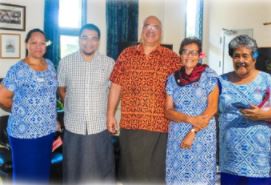The Samoa Qualifications Authority (SQA) Board of Directors at its meeting on Thursday, 26 August 2021
approved the accreditation of the following five Higher Education programmes delivered by the Faculties of
Education and School of Medicine of the National University of Samoa (NUS):
Bachelor of Medicine and Bachelor of Surgery (MBBS)
Master of Education (M Ed);
Post Graduate Diploma in Education (PGDip Ed);
Graduate Certificate in Education (Grad Dip Ed); and
Bachelor of Early Childhood Education (B Ed ECE).
With Accreditation it is not just ensuring that programmes are of quality and relevant but associated qualifications
are also registered on the SQF. With the five programmes accredited, the associated qualifications have also been
approved for registration on the Samoa Qualifications Framework (SQF). For NUS, this brings the number of
L-R: Lealiifano Easter Manila-Silipa (CEO, SQA); Peseta Dr Desmond Lee Hang
(Deputy VC, NUS); Aiono Prof Alec Ekeroma (VC & President, NUS);
Tu’u Fu’a Hazelman (Director, SQA Board); and
Gatoloaifa’ana Tilianamua Afamasaga (Chairperson, SQA Board)
accredited programmes delivered to thirty one (31) from four Faculties and the Oloamanu Centre for Continuing
Professional Development. Two (2) other Faculties and the Centre of Samoan Studies are starting the process for
Accreditation.
The SQA is mandated by the SQA Act 2010 to coordinate Post School Education and Training (PSET); regulate
Quality Standards and Qualifications as well as Quality Assure PSET in Samoa. In implementing these functions,
the Programme Accreditation Process is in place to evaluate an organization’s capability of delivering an education
and training programme to the required standards. The process is conducted by a Panel of experts with the skills,
knowledge, experience and competencies in the areas/fields evaluated. For Accreditation of NUS programmes,
academics, distinguished professors and Quality Assurance professionals from Universities in New Zealand and
Australia as well as from the region including Fiji and Papua New Guinea with our own were involved.
An increase in the number of Technical and Vocational Education Training (TVET) especially Higher Education
programmes accredited is evident of quality and relevant education and training that are now available at the PSET
sub-sector of education in Samoa. Accreditation by SQA affirms that the Quality Standards and requirements are
met and consistent in terms of academic quality, improvement and accountability expectations established therefore
overall a ’Mark’ of Quality.
The NUS Vice Chancellor and President, Aiono Prof Alec Ekeroma, was thrilled on learning that five of their
programmes from the Faculty of Education and School of Medicine have been accredited by the SQA.
“Accreditation is synonymous with quality. Quality programmes reassures our students, parents, sponsors and
employers. All credit goes to the NUS staff who worked diligently to develop their programmes to meet international
and SQA standards”. Aiono added that with accreditation of the School of Medicine’s programme, they should be
able to attract students from around the region to study in Samoa. “Sponsors should show commitment in building
the capacity of the School of Medicine by sending all sponsored students to NUS now that our programme is
accredited.”
The SQA wishes to acknowledge and thank the Programme Accreditation Panels and the support of the NUS Vice
Chancellor & President and all staff members involved in the accreditation process. The commitment of the NUS
to deliver quality and relevant programmes is very important as 80% of PSET students are educated at the NUS.
Delivery of quality and relevant programmes ensures that graduates have the necessary skills and knowledge to
improve economic and social development. Dovetailed into the maintenance of quality education and training is
the need to maintain international comparability. is proof

